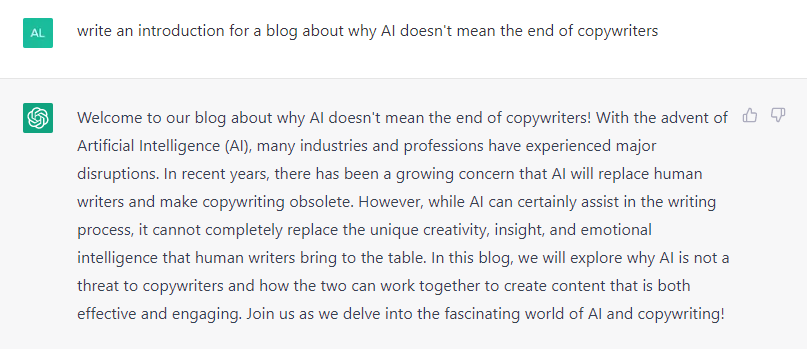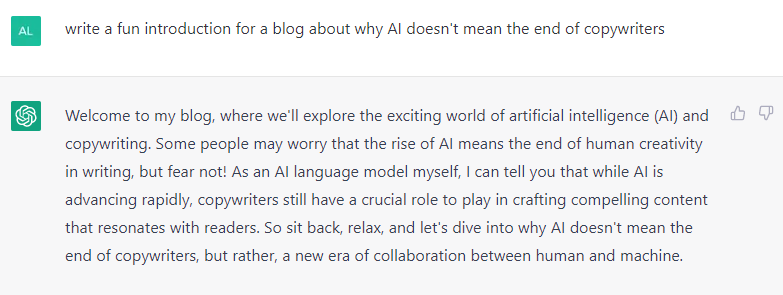*(written by a very biased copywriter)
One thing I’d like to get straight before I continue – I’m no technophobe. Yes, I believe the best games console ever invented is a toss-up between the PS2 and the Wii, but that’s just because new and shiny doesn’t necessarily translate to better (and I guarantee anyone that remembers the Buzz Junior Jungle Party game will second this opinion).
The same goes for AI writing technologies. Since ChatGPT broke the internet, the conversation that has been had over and over and over again [insert yawn] is ‘surely we don’t need copywriters anymore?’
But, it’s not that simple.
I have no doubt that many companies will opt for more AI-written content at the expense of their copywriters, but I think that would be a mistake, and I’m going to explain why.
Google can spot AI content
At a glance, you’d be forgiven for thinking that AI-generated content was written by a person. But, when you really look into it, there’s a certain je ne sais quoi that comes from a human touch that AI content lacks.
This is partly because the content that AI produces is not unique. It’s taken from mashing together snippets of content that has been found across the internet, and google, with its big brother eyes, knows this.
Historically, Google has dismissed AI content in favour of ‘people-first’ content according to its search guidelines. But, recently, the focus has shifted to how helpful the content is, regardless of who or what it was written by.
Some have taken this as a win for AI. But, I’d like to point out one of the key questions google asks when ranking its content:
“If the content draws on other sources, does it avoid simply copying or rewriting those sources, and instead provide substantial additional value and originality?”
The way that AI writing functions means that any content produced will not be original. Any additional value and originality can only come from the copywriter who creates the brief that is input into the AI program.
So, according to Google’s current guidelines, for AI content to perform well on the search engine, it needs the human touch to provide value and originality – making copywriters far from obsolete.
AI content alone is… meh
I have nothing against using AI as a tool. But, you need a creative behind that tool to know the right phrases to get the program working beyond giving you generic answers.
If you plug in a sweeping prompt, you’ll get a general answer that doesn’t really say anything. For instance, I asked an AI program to ‘write an introduction for a blog about why AI doesn’t mean the death of copywriters’ and it came back with this:

If you don’t tell it, it can’t guess the tone you’d like your writing to possess. And, even if you do, it feels a bit lacklustre. I edited this to say ‘fun introduction’ and I got:

So, the more detailed the prompt, the better, but it’s still lacking. It feels stale and the ‘fun’ phrases it integrates are widely overused – which makes sense, as it’s scraping the internet for what is considered fun copy.
You want the people reading your copy to feel something, whether it’s the urge to buy a product you’re selling or just to feel nostalgic for the titan that was the Nintendo Wii. You want to compel. And, AI just isn’t there yet.
The Compel Factor
The reason that AI-generated content isn’t as compelling as human copy is pretty simple – it lacks humanity. It can mimic conversation but doesn’t have anecdotes and stories to share that add so much value to copy.
People are much more likely to remember a story than facts. Why? Because it makes you feel something. According to neuroscientists, you can retain this feeling and the details associated with it for longer than facts alone.
And therein lies the value of the copywriter. A core skill of a talented writer is the ability to tell a compelling story and provoke a response with it. And, for now at least, this is a huge thing that continues to set copywriters apart from artificial intelligence.
Use AI to your advantage
As I’ve said, I do think there’s a time and a place for using artificial intelligence in tandem with copywriters.
I don’t know a copywriter who doesn’t rely on some sort of spellcheck and grammar plug-in to make sense of their quickfire writing when they’re in a flow state. Surprise surprise, these are powered by AI in the same way that AI copywriting tools are.
There’s a sweet spot to using this technology. Rejecting it completely will put you at a disadvantage to your peers but relying on it completely will result in soulless copy.
So, how’s best to use it?
Giving an AI program a prompt to see what it comes back with is a great way to begin brainstorming and help to shape a first draft of copy. The initial ideas that an AI program can generate are likely different to what you’d create yourself, forcing you to think in a different way and become a better writer for it.
Incorporating AI into your writing process can be a great time-saver. And, so long as you re-invest that time in the creative stage of content writing, AI can work with you to create engaging copy.
**
With all this in mind, I don’t think I will be out of a job too soon (please don’t let that jinx it).
But, just because the art of copywriting isn’t dead, that doesn’t mean you shouldn’t keep your eyes on the rise of AI. I certainly will. And, as it becomes more intuitive, maybe an AI program will be able to give me their unique opinion on the best gaming console ever created beyond:

… you never know.

Written by Alice
















